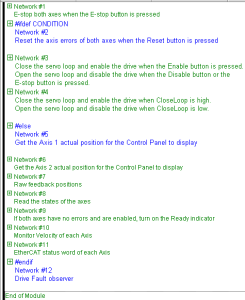Conditional Compiling
![]() The orientation components of a vector in space. in ST
The orientation components of a vector in space. in ST![]() Structured text - A high-level language that is block structured and syntactically resembles Pascal., IL
Structured text - A high-level language that is block structured and syntactically resembles Pascal., IL![]() Instruction list - This is a low-level language and resembles assembly.,
FFLD, and FBD
Instruction list - This is a low-level language and resembles assembly.,
FFLD, and FBD![]() Function block diagram - Describes a function between input variables and output variables. A function is described as a set of elementary blocks. languages.
Function block diagram - Describes a function between input variables and output variables. A function is described as a set of elementary blocks. languages.
- Conditional compiling directives condition the inclusion
of a part of the program
 The act of performing a sequence of instructions or commands. in the generated code based on pragma
The act of performing a sequence of instructions or commands. in the generated code based on pragma A compiler directive communicating additional pragmatic information.
Pragmas are processed at compile time, not at run time.
They pass information to the compiler..
A compiler directive communicating additional pragmatic information.
Pragmas are processed at compile time, not at run time.
They pass information to the compiler.. - Conditional compiling is an easy
way to manage several various machine
 The complete assembly of all connected parts or devices, of which at least one is movable. configurations and options in one unique application project.
The complete assembly of all connected parts or devices, of which at least one is movable. configurations and options in one unique application project. - Conditional compiling uses definitions as conditions.
#ifdef CONDITION
statementsYES...
#else
statementsNO...
#endif
- If CONDITION has been defined using #define syntax, then the statementsYES part is included in the code, else the statementsNO part is included.
- The #else statement is optional.
-
-
Intellisense facilitates the reading by coloring in gray the part of the program which is not active.
How to define conditional compiling directives?
| Language | Description |
|---|---|
|
FBD Language |
Directives must be entered as the text of FBD Network Breaks |
|
FFLD Language |
Directives must be entered as a network pragma with the In this example image:
|
|
IL Language ST Language |
-
-
Conditional compilation do not apply to actions in an SFC
 Sequential function chart - It can be used to program processes that can be split into steps.
The main components of SFC are:
- Steps with associated actions.
- Transitions with associated logic conditions.
- Directed links between steps and transitions. step.
Sequential function chart - It can be used to program processes that can be split into steps.
The main components of SFC are:
- Steps with associated actions.
- Transitions with associated logic conditions.
- Directed links between steps and transitions. step.
The condition __DEBUG is automatically defined when the application is compiled in DEBUG mode.
This allows you to incorporate some additional statements (such as trace outputs) in your code that are not included in RELEASE mode.
#ifdef __DEBUG
Printf('In debug mode', 0, 0, 0, 0);
#endif
See Also








